| Oracle® Fusion Middleware Administrator's Guide for Oracle SOA Suite 11g Release 1 (11.1.1) Part Number E10226-01 |
|
|
View PDF |
| Oracle® Fusion Middleware Administrator's Guide for Oracle SOA Suite 11g Release 1 (11.1.1) Part Number E10226-01 |
|
|
View PDF |
This chapter describes how to manage business events. Business events consist of message data sent as the result of an occurrence in a business environment. When a business event is published, other service components or database agents can subscribe to it.
This chapter includes the following topics:
For more information about business events, see Oracle Fusion Middleware Developer's Guide for Oracle SOA Suite.
You can subscribe to business events in Oracle Enterprise Manager Fusion Middleware Control Console. Business events consist of message data sent as the result of an occurrence in a business environment. You create business events in Oracle JDeveloper and include them in SOA composite applications that you deploy to Oracle Enterprise Manager Fusion Middleware Control Console. Service components and database agents can subscribe to business events. Only database agents can be subscribed to from Oracle Enterprise Manager Fusion Middleware Control Console. Service components are only subscribed to from Oracle JDeveloper. When a business event is published, the entity subscribed to that event receives it.
To subscribe to business events:
Access this page through one of the following options:
| From the SOA Infrastructure Menu... | From the SOA Folder in the Navigator... |
|---|---|
|
|
The Events page displays the following details:
A utility for searching for a specific business event by specifying a full or partial name and clicking the Search icon. Click the Help icon for details.
Business events, including the namespace used, event name, number of subscriptions to each event, and number of failed event deliveries. Business events are contained within their namespace.
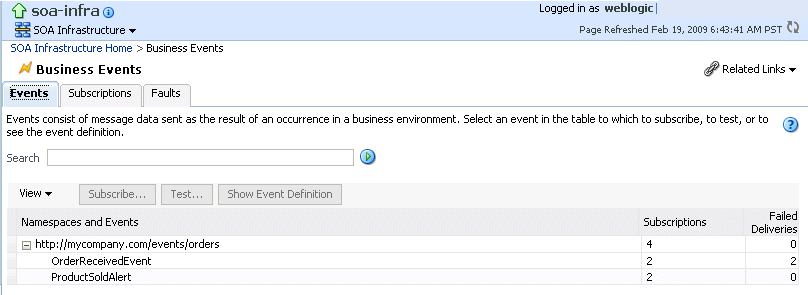
Select a specific event in the Namespaces and Events section.
Click Show Event Definition.
The event definition language (EDL) file for the selected event appears. The business event is defined using EDL. EDL is a schema used to build business event definitions.
In this example, two business events named OrderReceivedEvent and ProductSoldAlert appear in the event definition. The namespace (orders) and associated schema file (ProductOrder.xsd) are referenced.
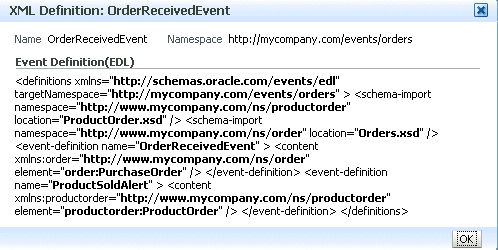
Click OK to close the dialog.
Click Subscribe to subscribe a database agent to the event selected in the Namespaces and Events table.
The Create Database Subscription to an Event dialog appears. You create an agent to listen for and subscribe to appropriate events when they are published.
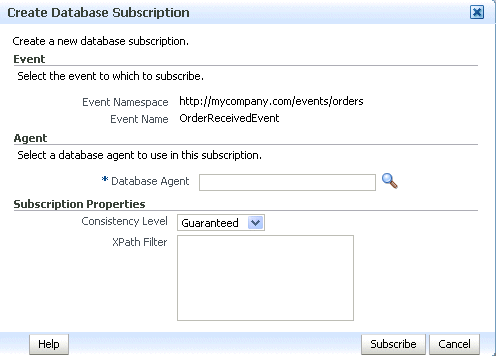
Enter the following values. An asterisk indicates a required field.
| Field | Description |
|---|---|
| Event Namespace | Displays the event namespace. |
| Event Name | Displays the event name. |
| Database Agent | Specify a database agent name or click Create Agent to create an agent. The agent listens for and subscribes to appropriate events when they are published. |
| Consistency Level | Select one of the following options:
|
| XPath Filter | If you want to filter the event, specify an XPath expression. When the subscription is delivered and the expression logic is satisfied, the event is accepted for delivery. If the logic is not satisfied, the event is not delivered. |
Click Subscribe.
Click Test to test a selected event. This action enables you to publish a test event that subscribers can act upon.
The Test Event dialog appears.
Specify the XML payload to use in the test.
Click Publish.
Note:
Enforcement of policies for event subscriptions is not supported in this release. You can attach or detach a policy to or from a service component that subscribes to a business event (such as Oracle Mediator) without being warned. This action does not result in any errors; policy enforcement simply does not occur.For more information, see the following documentation:
Section 1.2.8, "Understanding the Contents of SOA Composite Applications"
Oracle Fusion Middleware Developer's Guide for Oracle SOA Suite for details about business events
You can also create, edit, and delete existing database subscriptions. When a business event is published, service components and database agents can subscribe to it. Use this page to view all subscriptions to business events. This page also enables you to manage event subscriptions by database agents. Service component subscriptions are created in Oracle JDeveloper during design time and cannot be modified in Oracle Enterprise Manager Fusion Middleware Control Console.
Note:
If your SOA composite application includes a business event subscription, and you deploy different revisions of the composite, all event subscriptions from all revisions of the composite are active and receive messages. To receive the event with the latest revision of the composite only, it is recommended that you retire all previous revisions of the composite.To manage business event subscribers:
Access this page through one of the following options:
| From the SOA Infrastructure Menu... | From the SOA Folder in the Navigator... |
|---|---|
|
|
Click Subscriptions.
The Subscriptions page displays the following details:
A utility for searching for a specific subscription by specifying a criteria and clicking Search. Click the Help icon for details.
The database subscriptions, including the event name, namespace used, subscription agent name, optionally defined XPath filters, consistency level, and number of failed deliveries. You create database subscriptions to business events in this page during run time.
The component subscriptions, including the event name, namespace used, the service component subscribing to the event, the SOA composite application, optionally defined XPath filters, and the consistency level.
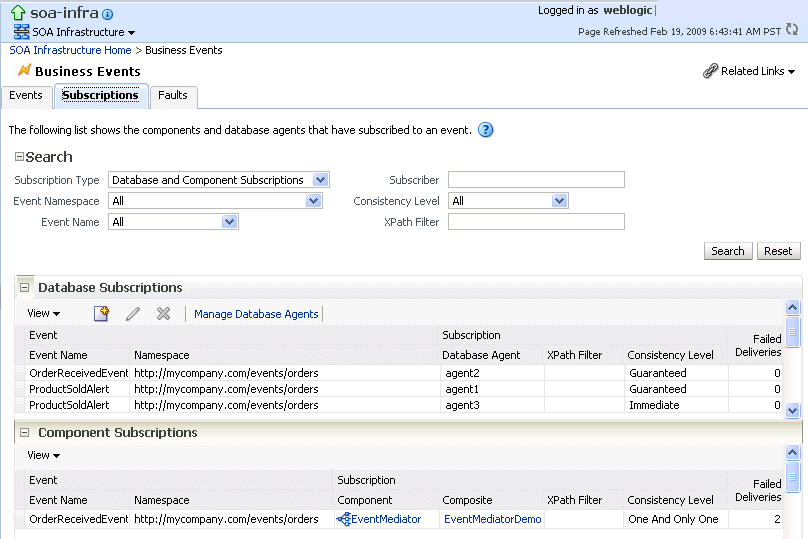
Click the appropriate icon below the Database Subscriptions title to create, edit, or delete a database subscription.
Click Manage Database Agents to edit the PL/SQL procedure or delete agents not currently subscribing to events.
In the Subscription Component column, click a service component to access its home page.
In the Composite column, click a SOA composite application to access its home page.
For more information, see the following documentation:
Section 32.1, "Subscribing to Business Events" for instructions on creating a database subscription
Oracle Fusion Middleware Developer's Guide for Oracle SOA Suite for details about business events
You can recover from business event faults that are identified as recoverable.
To recover from business event faults:
Access this page through one of the following options:
| From the SOA Infrastructure Menu... | From the SOA Folder in the Navigator... |
|---|---|
|
|
Click Faults.
The Faults page displays the following details:
A utility for searching for a specific business event fault by specifying a criteria and clicking Search.
Faults occurring in a business event, including the error message, whether you can recover from the fault, the time at which the fault occurred, the event namespace, event name, the subscriber, and the event type (database or Java). The Recoverable? column identifies faults for which recovery actions can be performed.
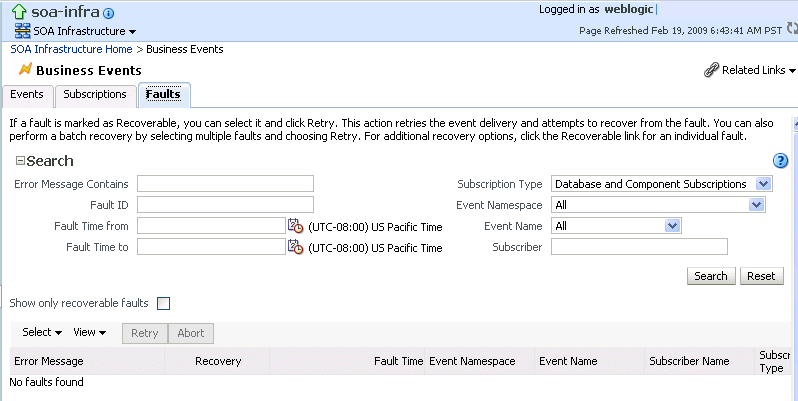
From the View list, select Columns > Fault ID to display the fault IDs for each error message.
Click a specific fault that has been identified as recoverable and select one of the following options:
| Action | Description |
|---|---|
| Retry | Retries the instance in which the fault occurred. |
| Abort | Aborts the entire instance in which the fault occurred. |
In the Logs column, click a specific log to access the Log Messages page with filtered messages specific to that instance.
For more information about business events, see Oracle Fusion Middleware Developer's Guide for Oracle SOA Suite.